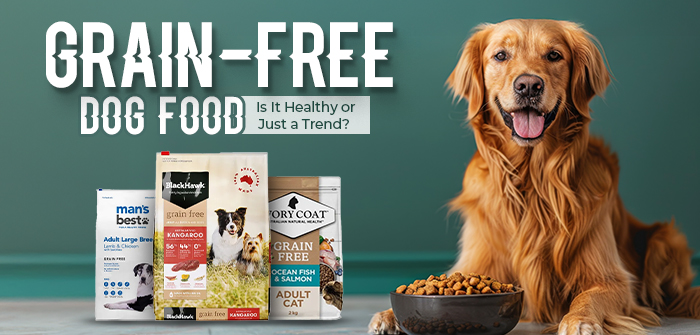Grain-Free Dog Food: Is It Healthy or Just a Trend?
We all love hopping onto the latest trends, and it is no different when it comes to our fur babies. Just as you might have swapped your whey protein for the latest ‘plant-based’ option, many pet parents are now reaching for premium ‘grain-free’ dog food in hopes of giving their pups the very best.
But while following a fad for ourselves might be harmless, when it comes to our pets’ health, the stakes are much higher. So today, when grain-free pet food is dominating the sales chart in the pet food industry, it is important to take a step back and ask: is grain-free dog food truly a healthier choice, or just another passing trend in the pet world?
In this blog, we’ll break down what sets grain-free apart from grain-inclusive dog food, the potential benefits, concerns, and whether it’s really the right choice for your dog.
Regular Dog Food vs. Grain-Free Dog Food: What’s the difference?
When we say ‘regular’ dog food, we mean dog food that contains traditional grains like wheat, corn, soy, rice, oats, barley, etc. Grains are not inherently bad for dogs, as they are a rich source of carbohydrates and fibre. They are important for energy, digestion, and overall well-being. Now, any dog food that is made without grains is the popular ‘grain-free’ dog food. These formulas come with alternative carbohydrate sources such as sweet potatoes, peas, lentils, or chickpeas.
Why Pet Parents Think Grain-Free Dog Food is a Better Choice?
Many pet parents believe that grain-free dog food is better for dogs, because the idea here is that grains are harder for some dogs to digest, and by eliminating them, we can make the food easy to digest for them. Plus, there is a myth that grains cause food allergies or sensitivities, so switching to grain-free options can help avoid such issues.
Moreover, most grain-free options boast higher protein content, with meat like chicken, beef, or salmon, which makes them better for those looking for high-protein meals that could help maintain the muscle mass of active dogs. For some dogs, grain-free food may also help in weight management, as it is lower in calories and replaces calorie-rich grains with fibre-rich vegetables.
Is Grain-Free Dog Food Bad?
While it sounds like a miracle solution for your dog’s good health, grain-free food isn’t for every dog. Here are a few things you must know if you are wondering if you should switch your dog to grain-free food.
Certain Health Risks
There has been a growing concern over a potential link between grain-free diets and canine dilated cardiomyopathy (DCM). Some studies suggest that the cause is the high concentrations of oligosaccharides, a highly fermentable carbohydrate, which may lead to gastrointestinal losses of taurine absorption in some dogs. Although the exact cause is unclear, this potential deficiency of taurine may lead to DCM.
Weight Concerns
Many grain-free formulas replace grains with high-carb vegetables like peas, lentils, potatoes, sweet potatoes, and legumes. While these alternative sources are healthier than grains for some dogs, they can still be high in carbohydrates and raise the risk of potential health problems like weight gain or diabetes for some predisposed breeds.
Marketing Hype
Over the past decade, grain-free food for dogs has topped the list of the most popular segments of the pet food market. However, it is necessary to understand that just because a dog food is grain-free doesn’t automatically make it healthier. Many grain-free foods are still packed with low-quality fillers, artificial additives, and preservatives and you must read the pack label carefully before buying.
The Takeaway: Grain-Free is not One-Size-Fits-All
Grain-free dog food can be a good choice for some dogs, but it is not necessarily the best choice for all dogs. It can be a godsend for dogs that are prone to allergies or sensitivities, but for those that do fine with grains, grain-inclusive food might be just as good.
The most important thing is to look at the overall ingredients and the nutritional value of the food, not just whether it’s grain-free or not. And as always, before making any changes to your dog’s diet, it’s best to consult with your vet to ensure you’re making the healthiest choice for your furry friend.
